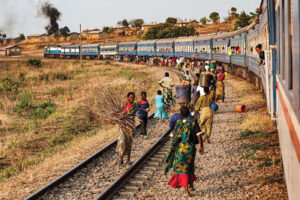by Ben Taylor
More financial challenges for Air Tanzania
Air Tanzania Limited (ATCL) has reported a loss of TSh 91.8 billion (~£25m) for the financial year 2023/24, a 62% increase in losses compared to the previous year. The was reported by the Controller and Auditor General (CAG), Charles Kichere, in his annual audit of government finances, presented to President Samia Suluhu Hassan on March 27 at State House in Dar es Salaam.
Despite receiving a TSh 100 billion subsidy from the government, ATCL faced significant operational challenges that contributed to the mounting losses.
Mr Kichere attributed the airline’s financial troubles largely to the extended repair time for its Airbus, which led to the grounding of planes for several months, severely affecting operations. He emphasised the urgent need for ATCL to work closely with the government to explore more efficient operational strategies.
Nevertheless, the Tanzanian government has stepped up its efforts to revive ATCL by continuing to invest in the acquisition of new aircraft, Minister for Transport Professor Makame Mbarawa told Parliament in May.
He reported that since President Samia Suluhu Hassan assumed office, the government has procured seven new aircraft, bringing the total number of new planes in ATCL’s fleet to 15, including one dedicated cargo aircraft. He added that the newly acquired aircraft have enabled the airline to expand its services to 27 destinations, up from 23 destinations served in March 2021.
New investment and management for TAZARA
The Tanzania-Zambia Railway Authority (TAZARA) is set to receive a USD $1.4bn investment from the China Civil Engineering Construction Corporation (CCECC) to overhaul its operations. Under the proposed deal, CCECC will invest $1 billion in rehabilitating railway tracks to improve safety, efficiency, and capacity, and $400 million will go toward the procurement of 32 locomotives and 762 wagons, enhancing both freight and passenger transport services.
The announcement was made by TAZARA managing director and chief executive officer, Mr Bruno Ching’andu, during the Zambia International Mining and Energy Conference (ZIMEC 2025) in Kitwe, Zambia, in March.
Construction and rehabilitation work is expected in the first three years, with CCECC handling full operational management for the following 27 years. The state-run CCECC is also the original builder of the rail line.
Mr Ching’andu said the decision to grant the concession followed a comprehensive evaluation of TAZARA’s long-standing challenges. The Public-Private Partnership (PPP) model was selected to align with TAZARA’s shareholder interests.
CCECC will be responsible for the immediate rehabilitation of the railway and the supply of rolling stock. It will also cover operational costs through concession fees payable to TAZARA while ensuring the efficient operation and maintenance of the railway system. At the end of the concession period, the fully rehabilitated assets will be returned to TAZARA.
The rehabilitation is seen as part of China’s strategy to secure mineral exports (including copper and cobalt) from Zambia and DR Congo via Dar es Salaam, competing with the US-backed Lobito Corridor to Angola’s coast.
At the present time, cross-border train services have been suspended due to political issues, not technical failures, requiring passengers to purchase separate tickets for Dar es Salaam to Mbeya and Tunduma/ Nakonde to Kapiri Mposhi, with independent travel between Mbeya and Tunduma.

